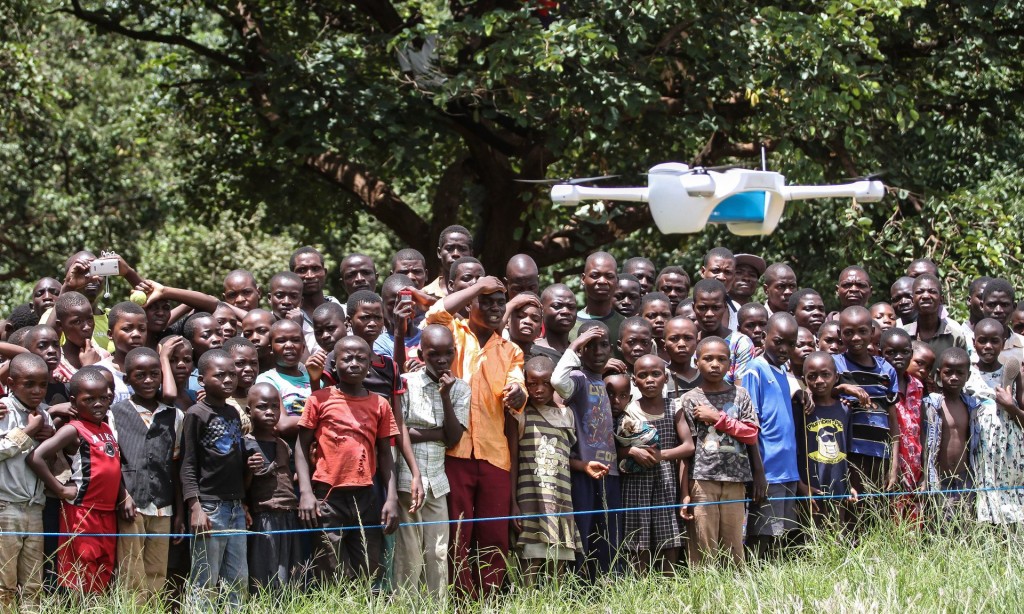Ines Lungu’s daughter clings to her mother’s skirt, searching the sky for whatever is buzzing overhead like a giant insect.
“I didn’t know that something that small could do a job so big,” says Lungu as she watches a drone hover above maize fields fringing a health clinic in Malawi’s capital, Lilongwe. The drone is being tested to see if it could bolster the health service in this poor southern African nation.
Before the drone was launched this month by Unicef, the UN children’s agency, people at the clinic were reassured that it was not the product of witchcraft, and that the drone would not harm them. Some bent nervously as it whirred closer. Others were amused, or bewildered.
The one-metre wide drone manufactured by US firm Matternet could mean the difference between life and death for people in Malawi’s remote communities.
Working with the government, Unicef is considering using drones to transport medical tests and blood samples from rural clinics to laboratories, avoiding the rutted roads that make even short journeys uncomfortable and unpredictable, partly because of fuel costs and a lack of motorbike drivers.
The test run in Lilongwe was to explore cost-effective ways to reduce waiting times for testing infants for HIV.
The drone successfully travelled 10km, from the clinic in Area 25 to the Kamuzu central hospital laboratory, in what Unicef said was the “first known use of UAVs [unmanned aerial vehicles] on the continent for improvement of HIV services”.
One in 10 people in Malawi are HIV-positive, including 17,000 children. An estimated 1 million were living with HIV in 2013, and 48,000 died from HIV-related illnesses that year, according to Unicef. While 90% of pregnant women know their HIV status, there has been a slowdown in the testing of babies and children.
It can take months for parents to get the results of blood tests for their babies. In 2014, about 10,000 children in Malawi died from HIV-related diseases. Less than half of them were on treatment.
Daniel Nyerenda, who works in a clinic in Matapila, 40km from Lilongwe, says motorbike taxis are supposed to come weekly to rural clinics to collect blood samples and return results. “Due to financial problems, and no money for fuel, they don’t come,” he says.
Delays in procuring fuel and maintaining motorbikes as well as the plunder of public money for private use, as documented in last year’s Cashgate scandal, can cost lives in one of the world’s poorest countries.
“Mothers come here and they don’t get the result, and the next time we tell them to come, they don’t,” says Nyerenda.
Matapila’s small clinic serves roughly 30,000 people from the surrounding farms. One day in March, people crammed on to benches or lay on the concrete floor waiting for appointments. Many will never visit their capital: for some the main tarmac road, just a 30-minute drive away, might as well be on another planet.
Andrea* is one of those waiting to see a health officer. She is HIV-positive and lives with the fear that her four-month-old child might be as well. Every time the baby cries, she worries it is a sign that her child has HIV. Today she has come to the clinic to try to get the results of blood tests carried out when the baby was born.
“I feel so guilty … I know about myself, but I don’t know the status of this child, and that pains me in my heart,” she says, pressing her fingers to her collarbone.
Andrea left home at 5am and walked for two and a half hours to get here.
“When I arrived, I felt happy because I knew that I was going to find out if this baby is HIV-positive,” she says.
But when Nyerenda checks the computer database, it turns out the results are not registered.
“It’s the not knowing that is more painful than knowing,” says Andrea.
Unicef says it takes an average of 11 days to get samples from health centres to a testing lab, and up to eight weeks for the results to be delivered back. That’s where Unicef hope the drones can make the difference.
“The faster the tests can get to the laboratory and back, the faster these kids can get on antiretrovirals,” says Jim O’Sullivan, a former pilot who now heads Matternet’s first Africa project.
“We are at the forefront of technology,” says Peter Kumpalume, Malawi’s minister of health, who attended the test flight in Lilongwe.
Kumpalume adds that Malawi was the first country in Africa to adopt Option B+ – which places all HIV-positive mothers on treatment for life – and an SMS advice system that has reduced transmission rates.
“The countdown to ending HIV/Aids has begun and today is another step forward in meeting that goal,” he says as he watches the drone whir into action.
“It’s a major step for children,” says Mahimbo Mdoe, Unicef’s Malawi representative. More test flights were due to be carried out through mid-March to assess viability, cost and safety. A second phase will test flights from remote areas.
“I think this is the leapfrog-in-technology effect,” Mdoe adds, comparing the arrival of drones to the seismic change wrought by “the movement from landline infrastructure – where you had to build poles every two metres – to mobile phones”.
* Some names have been changed to protect identities due to the stigma that still surrounds HIV/Aids in Malawi
- Hannah McNeish’s travel to Malawi was funded by Unicef

